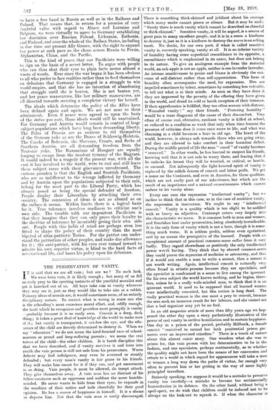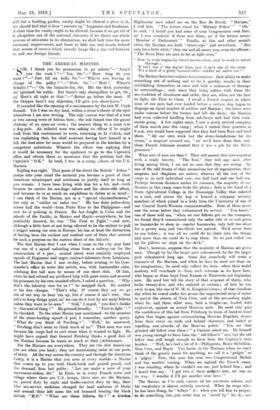THE PRESERVATION OF VANITY.
1T is said that we are all vain ; but are we ? No such luck. We were born vain, it is likely enough ; but many of us fell an early prey to the sporting instincts of the youthful moralist and got it knocked out of us. All boys take aim at vanity wherever they may see it, just as they would like to take aim at a rabbit. Primary ideas of morals are, it would sometimes seem, of an entirely disciplinary nature. To correct what is wrong in some one else is the schoolboy's most conscious moral effort, and, oddly enough, the fault which he recognizes and punishes most promptly is vanity —probably because it is so easily seen. Conceit is a deep, dark thing; it takes a great deal of knowledge of the world to make sure of it ; but vanity is transparent, it catches the eye, and the edu- cators of the child are fiercely determined to destroy it. When we say educators " we do not mean the kind-hearted race of school- masters or proud and long-suffering parents ; we mean the real tutors of the child—the other children. It is harsh discipline this that we have described, and if vanity survives it and lasts into youth the vain person is still not safe from his persecutors. Worse defects may find indulgence, may even be screened or stoutly defended ; but every man's vanity is fair game to his friends. They will make him smart for it if they can, and get amusement in so doing. Vain people, it must be allowed, do tempt attack. They give themselves away. A vain man has no distrust of his fellow-creatures such as oppresses and saddens the more humble- minded. He never wants to hide from their eyes; he expands in the sunshine of their notice and toils cheerfully for their good opinion. He has a source of happiness in himself. It is a shame to depress him. Not that the vain man is easily discouraged.
There is something thick-skinned and jubilant about his courage which many snubs cannot pierce or silence. But it may be said : " Surely there is much vanity which cannot be described as cheerful or thick-skinned." Sensitive vanity, it will be argued, is a source of great pain to many excellent people, and it is in a sense a kindness to destroy it, just as it is a kindness to destroy the nerve in an aching tooth. We doubt, for our own part, if what is called sensitive vanity is, correctly speaking, vanity at all It is an inferior variety of humility having some superficial resemblance to its opposite, a resemblance which is emphasized in its name, but does not belong to its nature. To give an analogous example from the material
world, an oak-apple is not an apple, neither is sea-lavender lavender.
An intense sensitiveness to praise and blame is obviously the out- come of self-distrust rather than self-appreciation. This form of humility often accompanies the need, for expression. Men are impelled sometimes by talent, sometimes by something less valuable, to tell out what is in their minds. As soon as they have done it they are impressed by the poverty of the offering they have given
to the world, and dread its cold or harsh reception of their treasure. If their apprehension is fulfilled, they too often scream with distress.
" Wounded vanity ! " say their friends. " Festering humility " would be a truer diagnosis of the cause of their discomfort. Very often of course real, obtrusive, exultant vanity is killed at school, or reduced to a condition so weak that only when time loosens the pressure of criticism does it come once more to life, and what was charming in a child becomes a bore in old age. The heart of the world, however, is always soft towards those who are going away, and they are allowed to take comfort in their harmless defect. During the middle period of life the man " cured " of vanity becomes " reserved." In other words, he has learned to suspect his friends, knowing well that it is not safe to weary them, and fearing that if he unlocks his breast they will be wearied, or critical, or hostile, or amused. Not infrequently the light-hearted spirit of vanity is replaced by the selfish demon of conceit and bitter pride. We get a name on the Continent, and even in America, for these qualities, which are not really part of our inheritance, but which arc the • result of an impatience and a natural censoriousness which cannot endure to let vanity alone.
Every one uses the expression "intellectual vanity"; but we incline to think that in this case, as in the case of sensitive vanity, the expression is inaccurate. We ought to say " intellectual;
conceit." Vanity is a quality which is too slight to be saddled with so heavy an adjective. Contempt enters very largely into the characteristic we mean. It is common both in men and women.
and flourishes best under persecution, being absolutely ineradicable. It is the only form of vanity which is not a bore, though it is some- thing much worse. It is seldom prolix, seldom even egotistical, and by no means the prerogative of the learned. People with an exceptional amount of practical common-sense suffer from it very badly. They regard shrewdness as positively the only intellectual power worth having. They think that by shrewd common-sense they could pierce the mysteries of medicine or astronomy, and that if it would not enable a man to write a sonnet, then a sonnet is not worth writing. Again, intellectual conceit is naturally very often found in artistic persons because they are specialists, and the specialist is condemned in a sense to live among the ignorant On his own subject the world knows nothing, and he begins, there- fore, unless he is a really wide-minded man, to think that it is an ignorant world. It used to be supposed that all learned women were intellectually conceited, but this notion is long dead. The really practical woman is the one most a prey to conceit, because she sees such an immense result for her labours, and she cannot see that a bad organizer may yet be no fool.
In an old magazine article of more than fifty years ago we hap- pened the other day upon a story pathetically illustrative of the power of real vanity to outlive humiliation and to sustain happiness.
One day in a prison of the period, probably Millbank, a female convict " contrived to extend her lank penitential prison gar-
ments over an improvised crinoline." There is a touch of nature about this almost comic story. One wonders what she was in prison for, this vain person with her determination to be in the fashion, and one speculates, perhaps sentimentally, as to whether the quality might not have been the means of her conversion and return to a world in which regard for appearances will take a man or woman a long way down the paths of virtue, far enough very often to prevent him or her getting in the way of more highly principled travellers.
Seriously speaking, we suppose it would be a mistake to preserve vanity too carefully—a mistake to become too sentimentally humanitarian in its defence. On the other hand, without being a spoil-sport, we do wish that children could be induced not to be always on the look-out to squash it. If when the character is still but a budding garden, vanity might be allowed a place in it, we should find that it does " succour up " happiness and frankness. A close time for vanity ought to be allowed, because if we get rid of it altogether out of the national character, if we direct our whole process of education to its elimination, we shall lack time for more necessary improvement, and learn to hide our real hearts behind that screen of reserve which already hangs like a fine veil between us and our foreign friends.



























 Previous page
Previous page